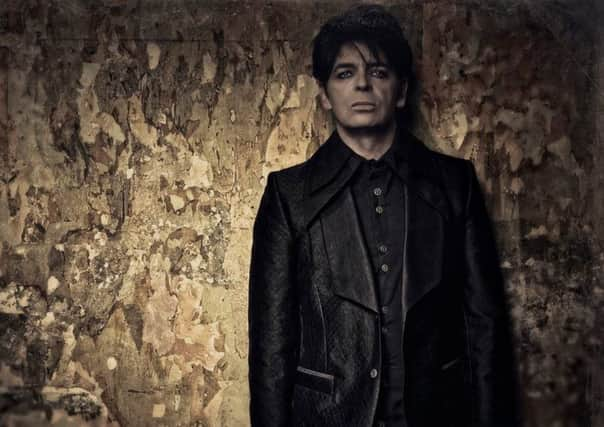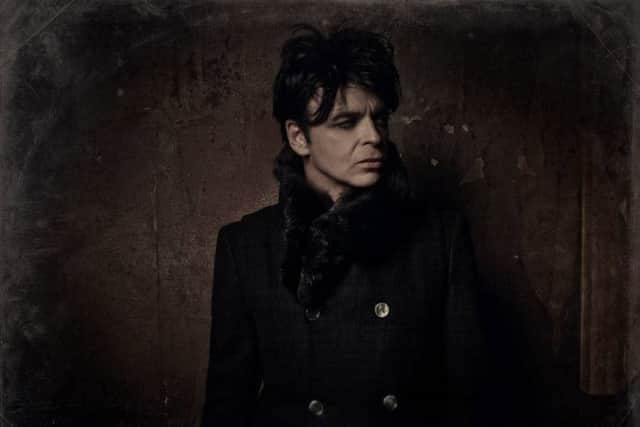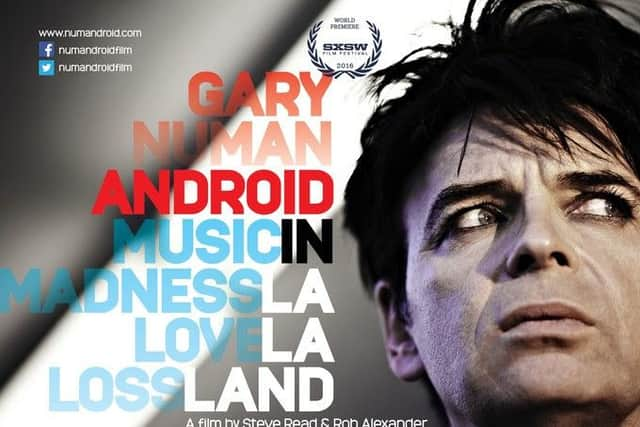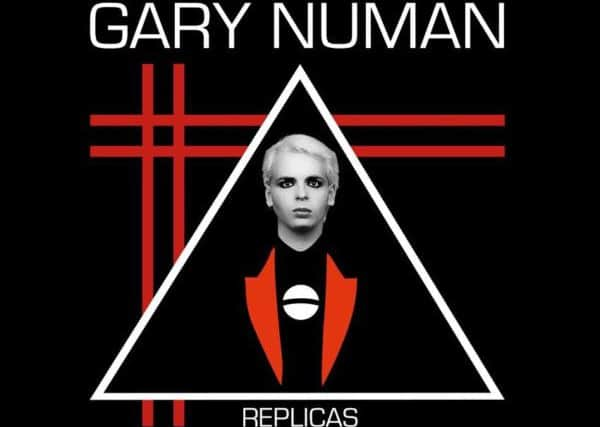Music interview: Gary Numan


A flurry of interest at the turn of the 1980s in all things electronic made Gary Numan a regular chart fixture. In the intervening decades he has also proved to be British music’s most durable artists, whose influence stretches from Trent Reznor to techno originator Juan Atkins.
Reverence has often paid to his first three solo albums – Replicas, The Pleasure Principle and Telekon – yet for years he resisted going down the ‘classic album’ route of performing them in their entirety live, fearing being labelled an ‘80s pop star’.
Advertisement
Hide AdAdvertisement
Hide AdIn a Q&A for The Yorkshire Post, he explains the reasons that persuaded him to relent on his autumn tour, which stops off at The Foundry in Sheffield next week.


You’ve been strongly against the idea of being labelled an “80s pop star”, preferring to look forward rather than back. What persuaded you to revisit your first three solo albums on your autumn tour?
Two reasons. The most important being that with the success of the Splinter album, which was widely regarded as one of the best, if not the best, album I’ve ever made, I felt as if I’d finally come out of the shadow that my early success created. For a long time, whenever I was mentioned, it was as an 80’s act, and it was that feeling that I fought so hard to get rid of. Splinter finally put all that to bed and I was seen, without question, as an ongoing viable artist. With that I was able to look back on my earlier music not as something to distance myself from, which I’d done mercilessly for many years, but as something to be proud of. After all, it’s considered to be very influential and ground breaking stuff so I should be proud of it. But, my interest is still firmly in what I’m doing next, rather than what I’ve done before, groundbreaking or not. So I’m still very much driven by the excitement of new music rather than my back catalogue. Which brings me to the other reason for this tour being older stuff, which is my new album isn’t finished and so I have this gap, an opportunity to tour songs I very rarely play live while I work on the new one in the studio. Not only that, but because I don’t usually play much old stuff a fair number of my fans get pretty frustrated by that. This gives me the opportunity to play some of those older songs, outside of a new album cycle, which hopefully keeps those fans happy, and which means when I start touring the new album in 2017 I can concentrate on new stuff with a clear conscience.
You had more than your fair share of brick bats when you emerged in the late 1970s. How does it feel to now be regarded as one of electronic music’s most important innovators?
Advertisement
Hide AdAdvertisement
Hide AdIt feels great, but it’s not something that lives with you day to day. I don’t wake up feeling like an important innovator that’s for sure. I am riddled by self doubt and a crippling lack of confidence, despite the many kind things that are said about me. I am very forward thinking, I genuinely believe that we must continue to earn our status with every album we make and so I am driven to move forward, to create new sounds, new ideas, to not repeat myself and to always push barriers if I possible can. It’s a very cool feeling to read those cool comments though, or when somebody samples or covers a song. I don’t take it for granted at all.


Do you have any particular memories of making of Replicas, The Pleasure Principle and Telekon?
Replicas was recorded in a basement studio in the Soho area of London. We had just a few days to record and mix everything so it was very rushed, lots of mistakes that should have been fixed were left as we just had no time for perfection. It’s a very raw album because of that. I didn’t own a synth then so everything was rented for a few hours and then disappeared. I had to create sounds very quickly, record them quickly, so it was either very experimental, or amateurish, depending on how generous you feel.
The Pleasure Principle was a big step up as far as the studio was concerned. I decided, mostly as a reaction to negative press about electronic music not being real music, to not have guitars on that album. I’m not sure that was a wise move but it definitely forced a style and sound all its own. I was making that album as Replicas went to number one so it was a very exciting time.
Advertisement
Hide AdAdvertisement
Hide AdTelekon was made not long after after The Pleasure Principle (all three were made within a 12 month period) and is a stark witness to the trouble I was having adapting to my new pop star life. I didn’t take to it well. Telekon does a pretty good job of showing a young man struggling to cope with one of life’s bigger changes, from unknown to world famous, if not overnight then over a few weeks.


A sense of urban dystopia seemed to loom large in your work at that stage. Were you an avid reader of writers such as JG Ballard and Philip K Dick from an early age?
Philip K Dick yes, I was a big fan. I remember reading Do Androids Dream Of Electric Sheep when I was a young teenager. That made quite an impression. The only Ballard book I ever read was The Atrocity Exhibition. I read a lot of sci fi back then but the books I liked the most were those that dealt in the near future. My Replicas album started life as a series of short sci fi stories intended to be a book. After that album though, and a handful of songs on the next one, I never went back to sci fi, didn’t write any, didn’t read any.
Did the early ‘robotic’ stage persona you adopted help to shield you from your shyness of being in the public eye?
Advertisement
Hide AdAdvertisement
Hide AdIt wasn’t meant to be robotic, I’m just a s*** dancer. But yes, the entire image and stylisation of everything was built deliberately as a character to hide behind. It was my way of side stepping my shy nature. I have Aspergers so I had enough issues just getting through life without deciding that standing on a stage was the right career choice. The images allowed me to pretend to be something I wasn’t, until enough years went by and I finally became the thing I had always pretended to be. I have no problem being in front of people now, in fact it’s pretty much all I’ve ever know as an adult.


Your most recent album, Splinter, was an intensely personal record about a difficult time in your life. Do you feel your next album could be quite different?
I don’t know but a great deal has happened since I made Splinter, and much of it has been very stressful, so I think I have yet another block of experiences and memories that will allow me to get ever darker with the songwriting. I do know the new album isn’t going to be easy listening. Every album I’ve made since the early 90’s has been darker and more aggressive than the one before. I would like to keep that trend going.
You crowdfunded Splinter rather than go down the more traditional record company route. Which way do you think you might go in future?
Advertisement
Hide AdAdvertisement
Hide AdI went with Pledge Music because it’s entirely music orientated and can be used in a number of ways, not just crowd funding. I didn’t choose the crowd funding approach as, luckily, I have no need for it financially and I have my own studio anyway so recording isn’t overly expensive for me. I used Pledge as a huge pre-sale for the album. So ‘pre’ in fact it started before I’d written a single note. There are many advantages to this but it doesn’t entirely replace a record label. You have to look at what you are going to do with the album after Pledge and that is something I’ve been working on a lot these past few months. I like Pledge a lot though and I think I’m very likely to use them again in the future.
You have lived in the US for the last few years. How do you find life - and the music community – there compared to the UK?
First of all I must point out that leaving the UK was not an easy thing to do. It’s not something done lightly at all but I genuinely felt, and still do, that my life and career prospects are better being based in Los Angeles, and those of my children. But, I’m British, I grew up in Britain, first made it in Britain and the British are still my strongest supporters so leaving was very difficult. Having said that life in LA is very nice. The weather is beautiful and gives you a very outdoor life, all year round. You have the ocean, mountains, some spectacular scenery and there is just a ridiculous amount of things to do. The music community is very vibrant and there is a great deal of collaboration going on all the time.


Gary Numan plays at The Foundry in Sheffield on September 15. For details CLICK HERE
Android In La La Land
Advertisement
Hide AdAdvertisement
Hide AdGary Numan’s life is explored in a new documentary, Android in La La Land, which is screening with a Q&A with directors Steve Read and Rob Alexander at the Showrooms in Sheffield on September 12, Hyde Park Cinema in Leeds on September 13 and Hebden Bridge Picture House on September 18.
Numan says the film “mainly looks at my moving to the US, making the last album Splinter and partly my relationship with my wife Gemma”.
He adds: “It’s not my film, I didn’t make it or finance it, I’m just the subject of it. It was interesting in that the editing can take the same footage and yet give it an entirely different meaning depending on how it’s put together. I found that quite frightening to be honest and we battled with that quite a bit during the making of it.
“I’m not mad about it to be perfectly honest but people seem to like it. I’ve just released a DVD, Reinvention, which is another Numan documentary first shown on TV a few years ago and there is another, a full life and career examination, being made in the US at the moment.”
For screening details CLICK HERE